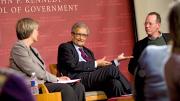In December, Harvard commemorated the sixtieth anniversary of the Universal Declaration of Human Rights, promulgated in the aftermath of World War II to help prevent future wars and to provide a model for how nations and their citizens should treat each other. Yet the very evening after the Declaration was adopted by the United Nations General Assembly, Eleanor Roosevelt—who chaired the UN committee that drafted the document—questioned “whether a mere statement of rights without legal obligation would inspire governments to see that these rights were observed.” As President Drew Faust said in recalling Roosevelt’s words, “We cannot be complacent, because as uplifting as the Declaration is…every day, every single one of those articles is violated somewhere.”
Faust spoke on December 10 at a public event at the Harvard Kennedy School that capped a week of commemorative observances. The evening began with dramatic readings of each article, and concluded with a performance by Malian singer and women’s rights advocate Oumou Sangare. The intellectual core was a panel discussion with “two extraordinary human rights thinkers and practitioners,” said Faust—Lamont University Professor Amartya Sen and Presley professor of social medicine Paul Farmer—who took up Roosevelt’s question and sought to establish “how far we have come and how far we have to go.”
The Declaration, said Sen, contributed to the world of ideas in at least four distinct ways. First, it took the view that human rights should not be seen as protective legal instruments but as ethical demands that might lead to legislation; it is a call to “reorganize the world in such a way that these rights are actually realized.” Second, by recognizing that laws are not the only avenue for advancing its agenda, the Declaration’s fulfillment has come to depend on “many other ways of advancing the cause,” including public discussion, social monitoring, investigative reporting and the normal functioning of the media. Third, the Declaration “takes a much larger list of freedoms and claims under its protective umbrella” than “the American declaration of 1776 and the French declaration of 1789”: it asserts “not only basic political rights, but the right to social security and the right to work, the right to education, protection against unemployment, the right to join trade unions and the right of just and favorable remuneration.” Finally, said Sen, the Declaration is “remarkable…in that it applies to everybody in the world without exception.”
The importance of universal application was underlined when Farmer responded to a question about his work, which centers on providing healthcare to the poor. “In medicine,” he said, “if we have no recourse to a rights framework, people who are living in poverty are in big trouble. Why? Because the total commodification of medicine means that in any setting, some people will always be priced out of the market. You need a safety net for the…destitute sick. Is that socialist? I don’t know…but I know that the notion of markets and commodities for everything doesn’t help everyone, and if your constituents—as mine happen to be—are people who live in poverty, we need complementary frameworks.” As Sen concluded in his assessment of the Declaration, even though the rights it articulates remain unrealized for many, its “vision remains hugely important in the contemporary world.”








